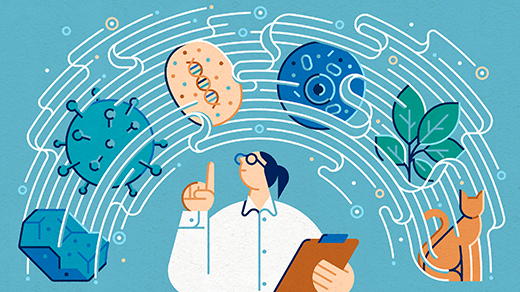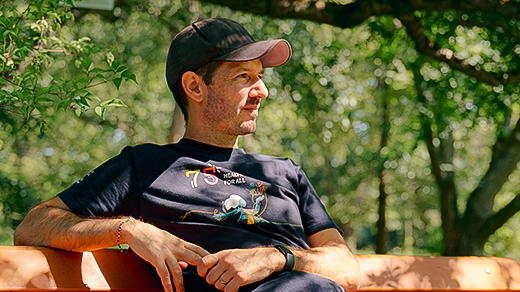What's up in
Viruses
Latest Articles
A Cell So Minimal That It Challenges Definitions of Life
The newly described microbe represents a world of parasitic, intercellular biodiversity only beginning to be revealed by genome sequencing.
The Microbial Masters of Earth’s Climate
A collection of short dispatches from the field of climate microbiology conveys the contributions that single-celled life forms make to our climate system, and how we can work with them to address climate change.
The Viral Paleontologist Who Unearths Pathogens’ Deep Histories
Sébastien Calvignac-Spencer searches museum jars for genetic traces of flu, measles and other viruses. Their evolutionary stories can help treat modern outbreaks and prepare for future ones.
Viruses Finally Reveal Their Complex Social Life
New research has uncovered a social world of viruses full of cheating, cooperation and other intrigues, suggesting that viruses make sense only as members of a community.
During Pregnancy, a Fake ‘Infection’ Protects the Fetus
Cells in the placenta have an unusual trick for activating gentle immune defenses and keeping them turned on when no infection is present. It involves crafting and deploying a fake virus.
Nobel Prize Awarded to mRNA Vaccine Scientists
Katalin Karikó and Drew Weissman have been awarded the 2023 Nobel Prize in Physiology or Medicine for discoveries leading to mRNA vaccines, such as those that protect against Covid-19.
How Many Microbes Does It Take to Make You Sick?
Exposure to a virus isn’t an all-or-nothing proposition. The concept of “infectious dose” suggests ways to keep ourselves safer from harm.
What Has the Pandemic Taught Us About Vaccines?
Should Covid-19 vaccines be judged by how well they prevent disease or how well they prevent death? Anna Durbin, a public health expert and vaccine researcher, talks with Steven Strogatz about the science behind vaccines.
Global Microbiome Study Gives New View of Shared Health Risks
The most comprehensive survey of how we share our microbiomes suggests a new way of thinking about the risks of developing some diseases that aren’t usually considered contagious.








